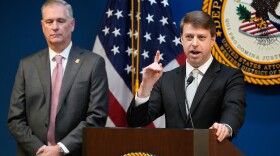Next month's midterm elections could hinder national and local efforts to pass or even keep laws addressing climate change, according to experts from Duke University. But climate change is mostly absent from the discussion on the campaign trail.
Issues such as the economy, the Jan. 6 insurrection, abortion and immigration are getting most of the attention as Republicans try to regain control of Congress and gain power in state and local elections.
"This is a very high-stakes election for climate change," said Geoffrey Henderson, who studies climate policy at Duke's Sanford School of Public Policy.
Speaking during a briefing with reporters Wednesday, Henderson said Democrats also face other headwinds: The president's party traditionally faces a backlash after two years.
"If the Republican party wins a majority in the House of Representatives, Congress is going to lose its ability to enact climate policies that have solid majority support in every single congressional district, including funding research into renewable energy sources, regulating carbon dioxide and providing tax rebates for energy-efficient vehicles and solar panels," Henderson said.
Democrats are talking up the Inflation Reduction Act, which, they note, is actually the largest climate bill Congress has ever passed. But those discussions often focus on the bill's non-climate benefits, such as jobs, lower utility bills and improved public health, Henderson said.
Kay Jowers of Duke University’s Nicholas Institute for Energy, Environment and Sustainability and the Kenan Institute for Ethics, said the Republicans could even try to unwind the Inflation Reduction Act.
“If they overtake a majority in the House, it’s possible that the Inflation Reduction Act could be at risk. We tend to see that when major bills like this are put in place and are in place for a while and have begun to be implemented, it’s difficult to completely overturn them. But they certainly could throw up roadblocks and barriers,” Jowers said.
At the state and local level, the stakes are also high, the experts said.
Climate change is explicitly on the ballot in two states, in the form of policy referendums:
- In California, Proposition 30 would increase taxes by 1.75 percentage points on those making more than $2 million a year. The state would use the extra $3 billion to $5 billion in revenues to pay for incentives for buying zero-emission vehicles, expand the vehicle charging network and prevent wildfires.
- New York's Proposition 1 asks voters to approve $4.2 billion in bonds that would pay for environmental improvements, land conservation, flood controls and other infrastructure to reduce the impacts of climate change.
"So we're definitely seeing it come up in ways that specifically cite climate change as the goal,” Jowers said. "But climate change shows up in so many policies that we don't think … There's so many issue areas that are affected by climate."
For example, she said, "Immigration policy is related to climate because climate is driving a great deal of migration across the world and even across the United States. We see it coming up in economic development policy (and) the Inflation Reduction Act."
Little attention in N.C.
At the local level here in North Carolina, climate change has largely not been on the agenda. It's mostly absent from the U.S. Senate race between Republican Ted Budd and Democrat Cheri Beasley, even though Beasley expresses support for climate efforts on her website. Conversely, climate change isn't mentioned on Budd's website list of major campaign issues. Instead, he's known as a supporter of fossil fuel pipelines, oil and gas drilling and cheaper gas. (For an excellent review of climate in the Beasley-Budd race, see James Bruggers' Oct. 21, 2022, report on Inside Climate News).
The outcome of General Assembly elections also could determine how far Democratic Gov. Roy Cooper can go with his climate efforts, said Henderson.
"The legislature (House Republicans) is just five seats away from reaching a veto-proof majority that would actually allow them to pass legislation that's been passed in many Republican-controlled states that would curb the ability of cities like Durham, to take the initiative in addressing climate change," Henderson said.
Specifically, he's referring to votes in cities across the country to ban natural gas for heating. A year ago, Republican lawmakers passed a bill that would've outlawed that in North Carolina. But it was vetoed by Cooper, and Republicans didn't have the votes to overturn it.
Henderson also mentioned Minnesota, where the state Senate is two seats away from shifting to a Democratic majority. That would allow Gov. Tim Walz to enact climate policies to promote electric vehicles and public transit.
Local races, too
And don't forget about local races, such as city councils and planning commissions, Henderson said. Those bodies have their own climate efforts and policies on planning and development, land use, transportation and other issues that affect climate change.
Meanwhile, voter attitudes are shifting. What once was a debate over the reality of climate change is now a discussion of how to react and adapt. Seventy-two percent of Americans now believe that global warming is happening, according to an annual survey by Yale University.
And it's no longer a Democrats vs. Republicans debate — at least not among voters Henderson said.
"The average Republican voter agrees that climate change is happening and that human activity contributes to it," Henderson said.
But there's a "major disconnect" emerging between Republican leaders and party members, he said.
"While the Republican Party in government has not yet shifted that much, with a few notable exceptions, the grassroots Republican Party is starting to change. So there is a growing constituency of Republican climate advocates," Henderson said.
Election Day is Tuesday, Nov. 8. For sample ballots and more information on races and voting, visit the N.C. State Board of Elections website.
This article originally appeared in WFAE's weekly Climate newsletter, which is sent Thursdays. Sign up for the newsletter at https://www.wfae.org/climate-newsletter-signup







